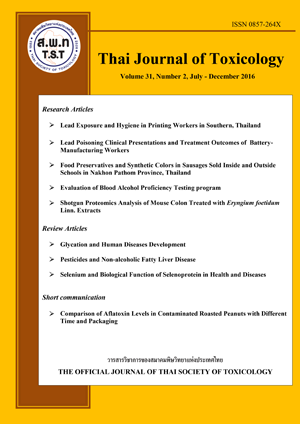เซเลเนียมและบทบาททางชีวภาพของเซเลโนโปรตีนต่อสุขภาพและโรคต่างๆ
Main Article Content
บทคัดย่อ
เซเลเนียมเป็นหนึ่งในแร่ธาตุที่มีความจำเป็นต่อร่างกายแต่มีความต้องการในปริมาณน้อย ซึ่งการทำงานในร่างกายจะเกี่ยวข้องกับเซเลโนโปรตีนที่มีมากกว่า 30 ชนิดในกลุ่มสัตว์เลี้ยงลูกด้วยนม แหล่งอาหารที่สำคัญของเซเลนียม ได้แก่ ขนมปัง ธัญพืช เนื้อสัตว์ ปลา ไข่ นม ผลิตภัณฑ์จากนมและเครื่องดื่ม ผัก และผลไม้ ปัจจัยที่มีผลต่อปริมาณของเซเลเนียมในอาหารทั้งจากพืชและสัตว์ ได้แก่ สภาพภูมิประเทศที่มีการปลูกผักและผลไม้ ตลอดจนการเลี้ยงสัตว์ ปัจจัยทางด้านสิ่งแวดล้อม ปริมาณเซเลเนียมในปุ๋ยสำหรับใช้ในเกษตรกรรมและอาหารสัตว์ ปริมาณการบริโภคเซเลเนียมในกลุ่มประชากรแต่ละประเทศจะแตกต่างกัน และปริมาณการบริโภคที่ต่างกันนี้จะบ่งบอกได้ถึงสถานะของเซเลเนียมในร่างกายและประสิทธิภาพของการทำหน้าที่ของเซเลเนียมในร่างกาย เซเลโนโปรตีนประกอบด้วยกลูต้าไธโอนเพอร็อกซิเดส (glutathione peroxidases), ไอโอโดไธโรนีนดีไอโอดิเนส (iodothyronine deiodinases), ไธโอรีดอกซินรีดักเตส (thioredoxin reductases) และเซเลโนฟอสเฟสซินเทเตส (selenophosphate synthetase) ซึ่งโปรตีนเหล่านี้ทำหน้าที่ในเรื่องของระบบการป้องกันหรือชะลอกระบวนการเกิดออกซิเดชั่น ปฎิกริยารีดอกซ์กระบวนการเมตาบอลิสมของไทรอย์ฮอร์โมน และการตอบสนองของระบบภูมิคุ้มกันในร่างกาย ภาวะที่ร่างกายมีเซเลเนียมในปริมาณต่ำ อาจจะนำไปสู่การเกิดโรคต่าง ๆ เช่น โรคหลอดเลือดและหัวใจ โรคมะเร็งและการทำงานของระบบภูมิคุมกันที่ผิดปกติ จากข้อมูลที่กล่าวมาข้างต้นจึงนำไปสู่การเพิ่มความพยายามและงานวิจัยที่สามารถนำเสนอวิธีการประเมินการบริโภคเซเลเนียม ภาวะของเซเลเนียมในร่างกายและกลไกที่เกี่ยวข้องกับการเกิดโรค เพื่อจะนำไปสู่ประโยชน์ต่อการดูแลสุขภาพ


